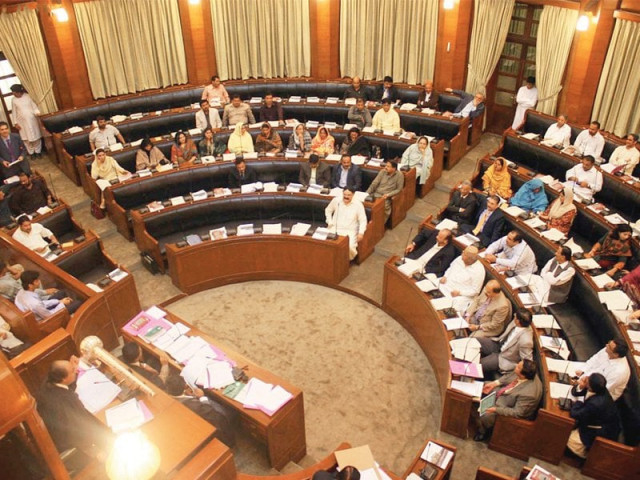Lawmaking in haste: In Sindh, ordinances sideline the legislature
More than half of the 76 laws enacted by provincial government in its present tenure were through special decrees.

EMore than half of the 76 laws enacted by provincial government in its present tenure were through special decrees. PHOTO: ONLINE/FILE
More than half of the laws passed during the tenure of the present provincial government were passed through a loophole in the system - using ordinances instead of the assembly.
The Sindh Assembly has so far enacted 76 laws, out of which 43 were brought up through ordinances, an official told The Express Tribune.
In a parliamentary set-up, ordinances are only issued in case of an emergency situation when the assembly is not in session. Under Article 128 of the Constitution, the governor can issue an ordinance on the chief minister’s advice. These laws have a life of 90 days and are subject to approval by the assembly.
Ideally, the government or any MPA can move a bill to be made into a law. The bill is then referred to the assembly’s relevant committee for legal and technical review. All relevant stakeholders are taken into confidence before moving the draft in the legislature for debate.

During the past four and a half years, the government issued 43 such ordinances despite the presence of a house of elected representatives - the Sindh Assembly.
This has not only irked the lawmakers from the opposition but from the treasury benches also, who say the proper lawmaking process was not followed and most of the laws were passed through ordinances rather than draft bills.
“We are the law makers and people have elected us for legislation,” Sindh Assembly member Arif Mustafa Jatoi told The Express Tribune. “Issuing ordinances suggests assemblies are meaningless as the laws are made outside this august house.”
“In developed countries, laws are passed after a long debate but here the government issues the ordinances and adopts them within minutes,” said Jatoi, one of the most active members of the assembly. “Most controversial laws were enacted through ordinances in Sindh.”
He then gave the examples of the Sindh Peoples Local Government Act, 2012, and the Sindh Civil Services Ordinance, 2012, through which the chief minister can appoint retired employees, officials of semi-government organisations in government departments and promote junior officials out of turn.
Seven ordinances were promulgated in the first parliamentary year in 2008-9, four in 2009-10, seven more in 2010-11 and another 18 in 2011-12. The number of ordinances so far issued in the current parliamentary year stands at seven, according to the Sindh Assembly progress report.

“The government’s seriousness in legislation can be gauged from the fact that only five sessions of the Sindh Assembly have been held in the past nine months,” former opposition leader Jam Madad Ali said. The government has passed six bills in the period.
During the last four and a half years, not a single law proposed by assembly members has been passed. Around 40 private bills were tabled by members of the Pakistan Peoples Party, Muttahida Qaumi Movement, Pakistan Muslim League-Quaid, Pakistan Muslim League-Functional and National Peoples Party during the assembly’s tenure.
“Whatever and whenever the government wants, it passes the law within a short span,” Ali complained. “Despite our best efforts, the government does not give the members enough time to initiate debate on the ordinance,” he said, referring to the Sindh local government ordinance, which was adopted within seven minutes.
It is the constitutional right of the provincial government to issue ordinances through the governor, the ruling party’s Sindh law minister, Ayaz Soomro, asserted. “The Sindh Assembly members can debate and propose their amendments whenever an ordinance is issued,” he said. “But unfortunately the opposition has no other agenda but to criticise the government [rather than suggesting revision]”
Published in The Express Tribune, January 4th, 2013.



















COMMENTS
Comments are moderated and generally will be posted if they are on-topic and not abusive.
For more information, please see our Comments FAQ